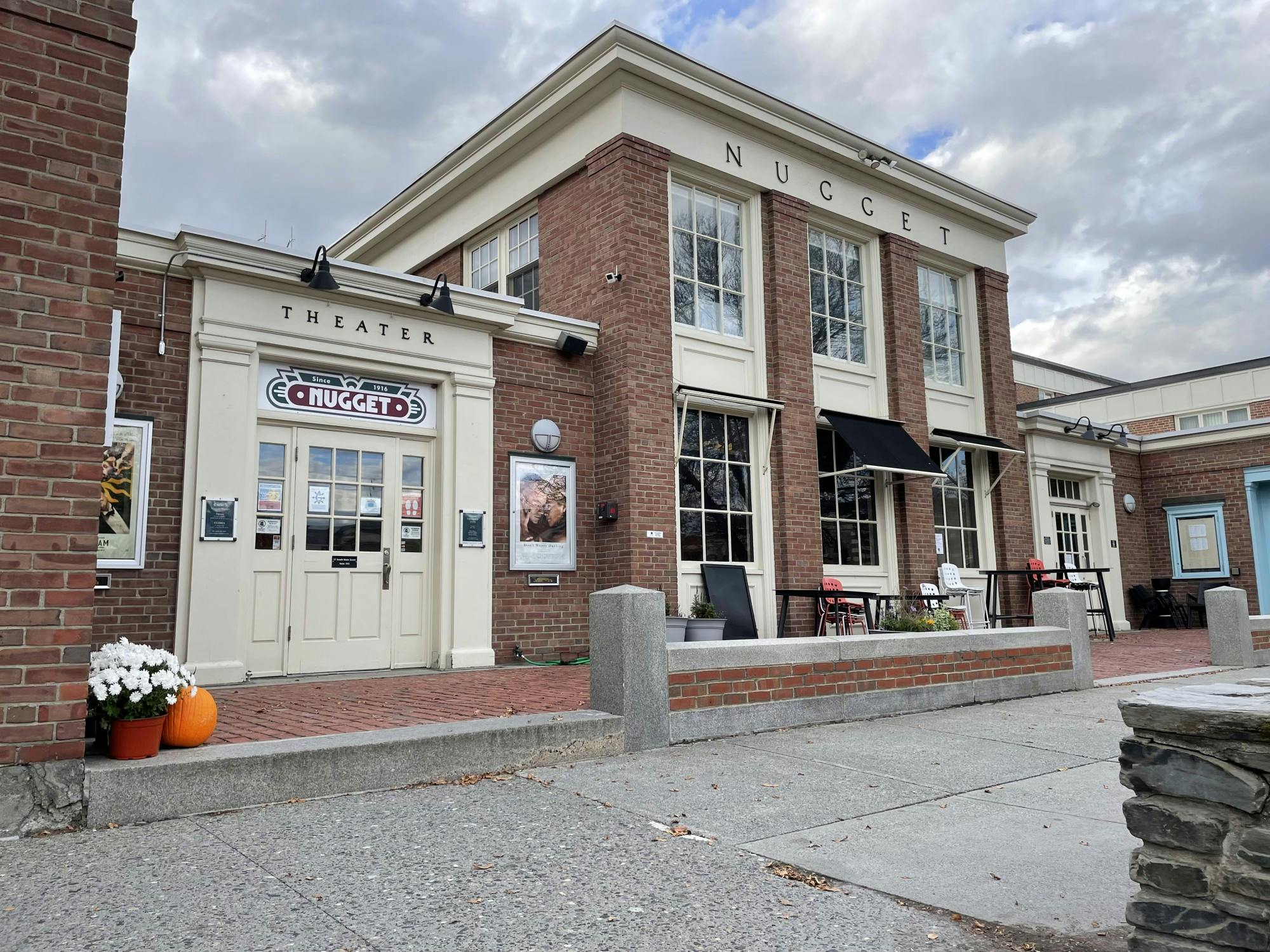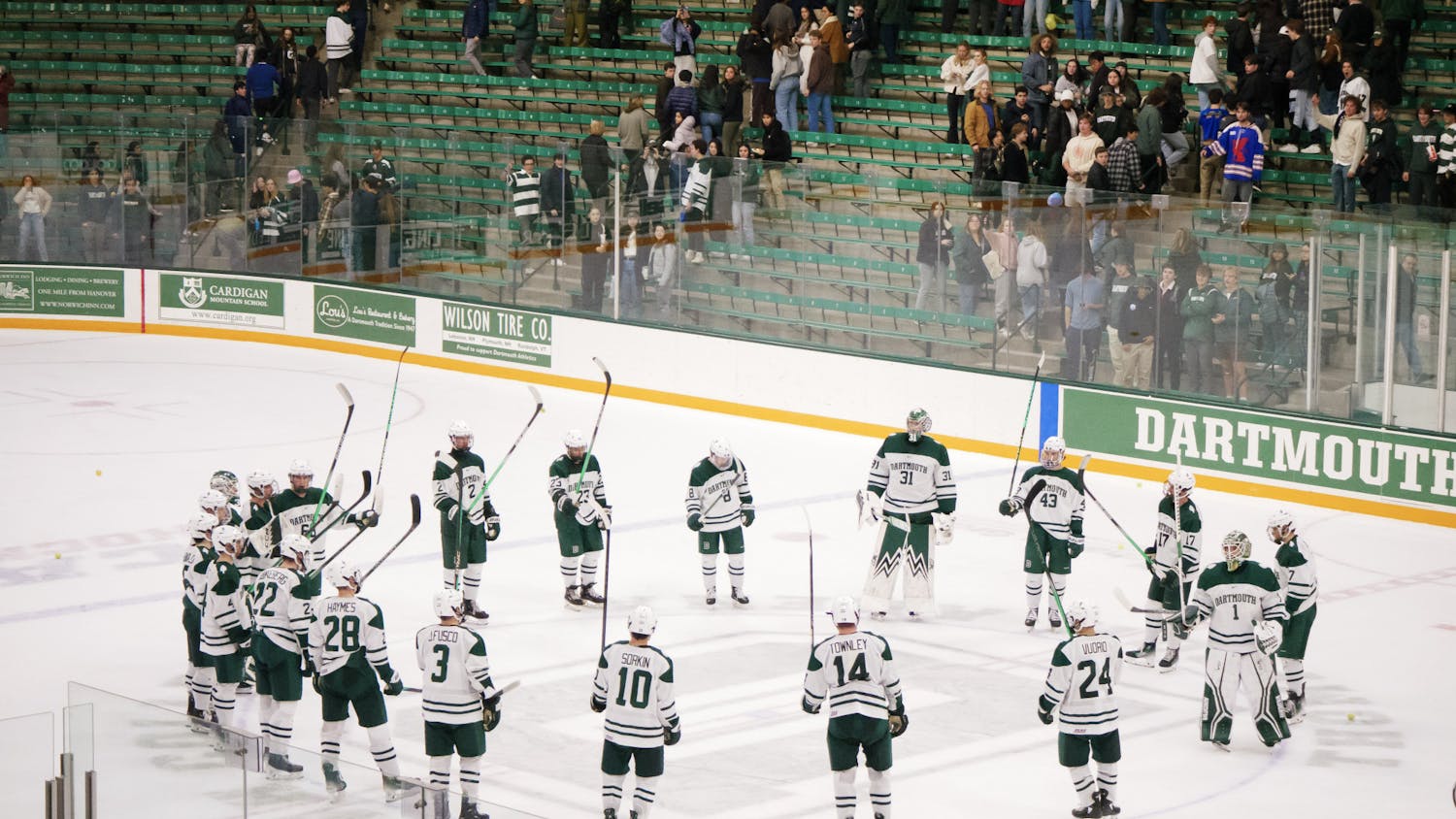This article is featured in the 2022 Homecoming special issue.
The Nugget Theater has a humble appearance that blends into Hanover’s quaint Main Street, but the theater has endured its fair share of drama. From being the subject of chaotic student traditions like the Freshman Rush and peanut pelting, to freak accidents like a 1944 explosion, the Nugget is a rich piece of Hanover’s history that hides in plain sight.
According to the Nugget’s website, a petition to establish a theater in Hanover first circulated in 1916. The petition was approved, and soon after, father-son duo F.F. and F.W. Davison began construction on the new venue, opening the original Nugget Theater with a showing of “The Alien” later that year. The success of the theater would eventually lead to it being donated to the town of Hanover in 1922, with all net proceeds going towards the town Treasury. That year, management responsibilities of the Nugget shifted to the newly-formed Hanover Improvement Society, also founded by the Davisons.
Jeff Graham, current general manager of the Hanover Improvement Society, described the present-day Nugget as a “main street mom-and-pop movie theater.”
“It’s just a very quaint, cozy [theater]. It’s like an art house,” Graham said. “We show high-end, top-end movies, and people appreciate the fact that we’re here, the way we do things. And we’re not all about glitz and glamor, but it’s just about putting on a good show, a good quality product and a nice, clean environment.”
Russ Brady, senior projectionist and technician at the Nugget, said that the Improvement Society maintains control over the theater’s operations.
“The Hanover Improvement Society owns and operates the Nugget, and they take care of the funding and upgrades,” Brady said. “This is pretty well maintained. We don’t have the newest equipment on the block, but it’s by far better than what some theaters have.”
The same, however, could not be said about the old Nugget.
Peanut-throwing, once a trademark tradition at the Nugget, was supposedly manufactured by the theater’s original manager and piano player “Texas Bill” Cunningham as a way of increasing theater attendance, according to the theater’s website. It was common practice for students in the back row to pelt students in the front before the movie began. Latecomers, freshmen and students with new haircuts were especially targeted. Some students even opted to throw jelly beans and apples rather than peanuts — according to the Nugget, Charles M. Dudley, Class of 1929, remembers being nearly knocked unconscious by a rogue apple.
According to the Nugget’s website, another unique — and coincidentally also violent — tradition associated with the old Nugget was the “Freshman Rush.” These rushes, perhaps more accurately described as raids, would usually occur towards the beginning of the year when hundreds of freshmen would storm the venue with the Student Assembly guarding the theater entrance. Ticket booths would be smashed, doors torn down, eyes blackened, noses bloodied and teeth chipped. It was only in 1937 that the Dartmouth administration finally “discouraged” the tradition.
The Old Nugget’s roughness, though part of its initial charm, also earned it a controversial reputation. According to the Nugget, The Dartmouth was an early critic of the theater’s subpar equipment quality and unsafe environment, as well as its occasional selection of vulgar and sexually suggestive films. On the flip side, the Nugget’s role as a source of funding for town improvement projects was undeniable and a token of the Davisons’ charitability. Nevertheless, the Old Nugget’s end came swiftly and suddenly when a fire broke out in the theater on Jan. 28, 1944, resulting in an explosion that decimated the building.
The theater’s destruction, however, would not spell the end of the Nugget itself. During its seven-year hiatus, the New Nugget relocated to Webster Hall — now known as the Rauner Special Collections Library — for movie showings.
The Nugget’s close relationship with the College is one that remains today, Graham said. He added that of Dartmouth’s institutions, the Nugget maintains a particularly positive relationship with the Hopkins Center for the Performing Arts.
“We get first crack at the new releases, so we actually have a very good relationship with the Hop and their movie people,” Graham said. “We compete more with people in the entertainment centers in Lebanon than we do with the Hop.”
The second (and current) Nugget Theater opened in 1951 with the showing of “Cyrano de Bergerac.” It didn’t take long for the theater to regain its momentum — coming off of what is largely considered to be the “Golden Age” of modern cinema, the Nugget peaked with around 216,000 attendees for the year in 1953.
However, the theater also saw its attendance drop to an all-time low in 1960, with only around 121,000 tickets sold that year. Despite this, the theater remained, solidifying itself as a character in the Upper Valley mythos, if not for its age then for its sheer tenacity.
Brady, who has been with the Nugget since 1985, attributed the theater’s 104-year longevity to the Hanover community.
“There are times when there aren’t students on campus…between terms and over the winter holiday break, so we have to rely on people in this area,” Brady said. “And, luckily, we’ve had good support from the people in this area.”
Perhaps one of the more striking differences between the Old Nugget and today’s is the relative lack of student presence, Sarah Jewett ’23 said. A frequent patron of the Nugget, Jewett said that for most students, going to the movies seems unnecessary in the streaming era.
“It’s so much easier to just sit in your dorm and watch a movie with your friends if you want than go to the Hop, go to the Nugget, which both cost money to go to,” Jewett said. “And also I think a lot of the big box movies that are coming out now aren’t always movies that people want to see.”
Despite an apparent lack of student enthusiasm, Jewett said she encourages people to explore the Nugget. “The Nugget is a local theater and you're supporting a Hanover small business when you go,” she said. “I would definitely recommend that students go more often.”




